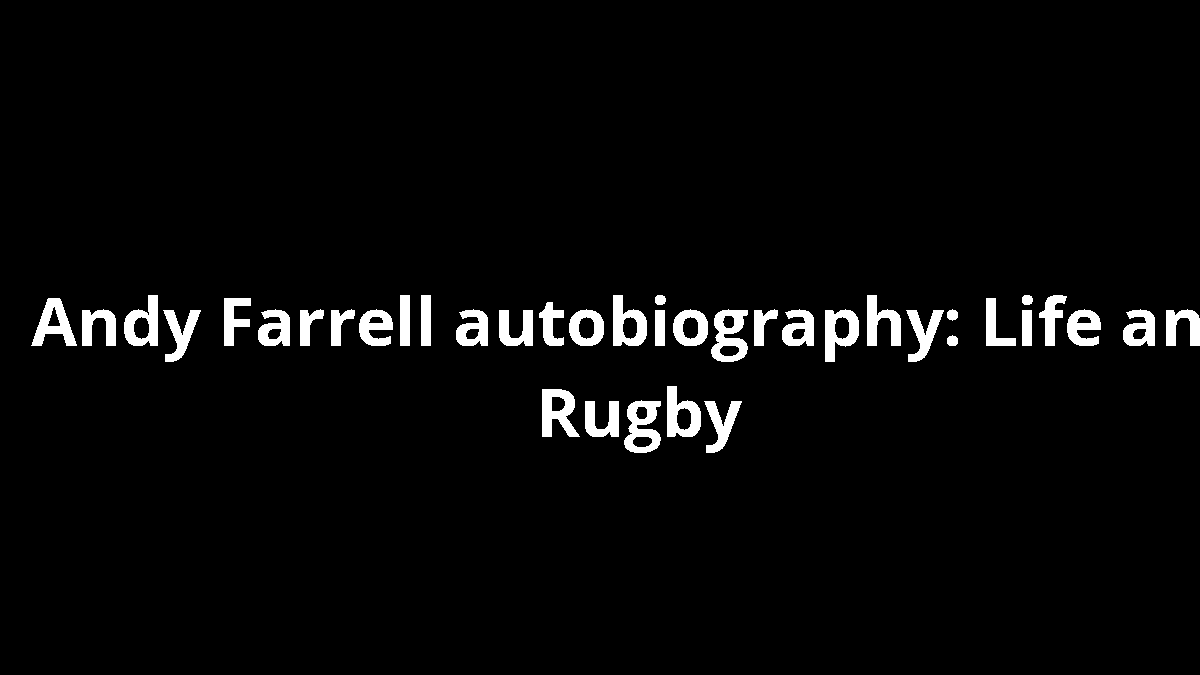Listen: Farrell on life, rugby, and feeling at home here
In a wide-ranging RTÉ Radio 1 interview, Andy Farrell autobiography offers an intimate look at life, rugby, and feeling at home in Ireland. Andy Farrell autobiography reveals the roots of his discipline and his lifelong pursuit of mastery. The chapters of Andy Farrell autobiography map a journey from teenage fatherhood to Ireland’s head coach. Andy Farrell autobiography shapes the core of his coaching ethos: resilience, teamwork, and an environment where players can thrive.
Life, family, and beginnings
Growing up with sport as a lifeline, Farrell learned early how daily routines can anchor a person. He credits family for instilling responsibility and focus that endure under pressure. His path followed a common arc in rugby: hard graft, mentors, and a belief that small gains compound over time. For Ireland’s head coach, those early days still drive the effort to perform and to guard the group against doubt. The discipline reflected in his early years echoes through the current Ireland setup, where preparation is non-negotiable and detail is king. BBC Sport Rugby has chronicled similar journeys, and readers can compare the resilience shown in those profiles with Farrell’s stance on preparation.
Belonging and home in Ireland
Finding a home in a foreign rugby nation shaped Farrell’s outlook. The sense of belonging translates into how he builds trust across a squad with diverse backgrounds. His reflections emphasize listening, learning, and giving players a sense of purpose. That approach aligns with Ireland’s culture of unity, which fans see in every Six Nations gathering. Meanwhile, supporters note the soft power of belonging as a weapon on and off the pitch. World Rugby’s leadership stories echo similar themes about inclusive culture, and Ireland’s performances underscore that ethos in action.
Farrell’s New Autobiography: The Only Way I Know
The title and its meaning
The book’s title signals clarity and consistency. The Only Way I Know serves as a compass for Farrell’s decisions, both on and off the field. He frames leadership as a daily practice rather than a grand gesture. The narrative moves from personal moments to tactical choices, showing how routine and ritual build trust. Readers will notice how the author uses concrete examples to illustrate leadership, resilience, and accountability. The forward momentum comes from feeling that every day offers a chance to grow, no matter the setback.
Lessons from the page and pitch
The autobiography blends personal stories with tactical insight. Farrell’s leadership style rests on preparation, clear expectations, and a calm, steady presence. It shows how he translates errors into learning moments for the squad. Mentorship emerges as a through line, with veterans guiding younger players toward professionalism. The book also highlights how culture is nurtured through accountability, dialogue, and a supportive environment where players can thrive under pressure. For broader context, outlets like World Rugby illustrate how leadership narratives shape modern teams.
Ireland Rugby: Farrell Reflects on Life and Leadership
Leadership through adversity
Farrell’s reflections reveal leadership forged in adversity, where personal trials become a source of strength. The message is simple: resilience is built through repeated, sometimes painful, preparation. He describes moments when doubt crept in and how the squad responded with unity. The approach mirrors Ireland’s collective mentality, where the smallest detail matters and the team’s mood matters as much as its skill. The narrative connects his life experiences with the way he coaches—calm, precise, and relentlessly focused on improvement.
Building a cohesive squad
Culture plays a central role in Farrell’s Ireland project. He emphasizes listening across generations, aligning training with psychological readiness, and maintaining standards under fatigue. The result is a cohesive unit that can absorb pressure and execute in tight moments. In this regard, Farrell’s leadership shares characteristics with other high-performing teams that emphasize trust, role clarity, and shared purpose. Readers can compare these themes with recent match reports and analyses from credible outlets such as BBC Sport Rugby and World Rugby.
From Teenage Fatherhood to Ireland’s Head Coach
Youth challenges
The journey from teenage fatherhood to a top national role is a compelling arc. Farrell describes early choices that shaped his resilience, including accountability to family and a commitment to personal discipline. Those decisions remain visible in the way he manages risk, handles setbacks, and demands accountability from players. The narrative makes clear that tough moments can become turning points when tempered by support and clear objectives. This section of his journey resonates with coaches and players who have faced personal barriers as part of their professional path.
From promise to plan
Farrell translates potential into plan through structured development, mentoring, and a relentless pursuit of progress. The book highlights how he balances ambition with patience, a critical trait for sustaining a long tenure with a national team. He underscores the importance of long-term thinking that prioritizes player growth, injury prevention, and mental toughness. The connection between youth experiences and senior leadership becomes evident as the narrative navigates milestones, turning points, and the gradual build toward a coaching philosophy that prioritizes people as much as systems.
Coaching Philosophy: Building a Culture with Ireland
Culture first
The central pillar of Farrell’s approach is culture. He argues that a strong culture creates consistency, even when technical form fluctuates. The book illustrates how a culture of accountability, openness, and mutual respect leads to performance under pressure. It also shows how leadership at the top must model the behavior it seeks from players. In practice, that translates into clear standards, regular feedback, and a daily rhythm that makes high performance accessible to everyone in the squad. Ireland’s recent campaigns provide tangible proof of how culture can drive results on big stages.
Preparing for big games
Preparation under pressure is a recurring theme. Farrell explains that preparation is not only about tactics but also about mental readiness and belief. He discusses routines, data-informed decisions, and the balance between aggression and control. The narrative stresses that the best teams win because they are resilient, focused, and willing to adapt mid-game. Fans can draw parallels with match-day routines and strategic choices seen in major internationals, with analysis from credible outlets supporting the broader picture.
RTÉ Interview Highlights with Brendan O’Connor
Unfiltered moments
The RTÉ interview offers candid, human moments that reveal the person behind the coach. Farrell speaks about the joy of mentoring, the pressure of expectations, and the humility it takes to learn from players. These moments are valuable for fans who crave authentic storytelling and for readers who want to understand how leadership translates into day-to-day leadership. The exchange also reminds readers that even elite coaches juggle personal and professional challenges with grace, a narrative that resonates across sports media.
Future of Irish rugby
Looking ahead, Farrell discusses continuity, renewal, and the need to maintain a competitive edge. He highlights the importance of succession planning, youth integration, and maintaining a relentless work ethic. The conversation reinforces the idea that Ireland’s rugby project is sustainable when leaders cultivate talent, foster a shared identity, and remain adaptable to evolving opponents. For those following international rugby, this outlook aligns with trends observed in global rugby development and the strategic directions pursued by major unions.
For readers seeking more context, articles from BBC Sport Rugby and World Rugby offer additional perspectives on Ireland’s approach to coaching, leadership, and performance on the world stage. These sources provide complementary analyses that enrich the narrative woven through Farrell’s autobiography and current role with Ireland.


